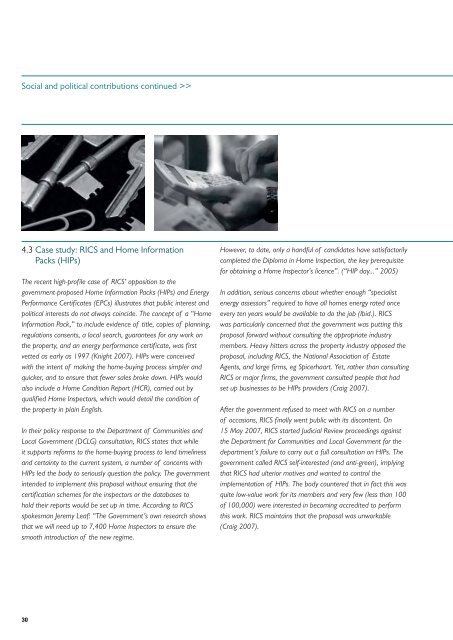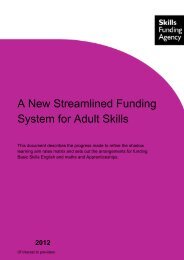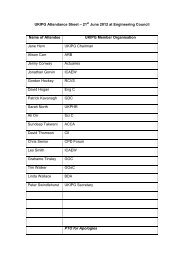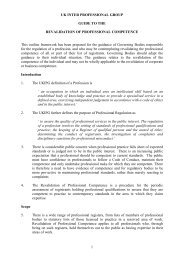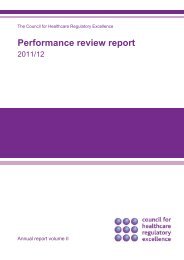BRITISH PROFESSIONS TODAY: THE STATE OF ... - Property Week
BRITISH PROFESSIONS TODAY: THE STATE OF ... - Property Week
BRITISH PROFESSIONS TODAY: THE STATE OF ... - Property Week
You also want an ePaper? Increase the reach of your titles
YUMPU automatically turns print PDFs into web optimized ePapers that Google loves.
Social and political contributions continued >><br />
4.3 Case study: RICS and Home Information<br />
Packs (HIPs)<br />
The recent high-profile case of RICS’ opposition to the<br />
government-proposed Home Information Packs (HIPs) and Energy<br />
Performance Certificates (EPCs) illustrates that public interest and<br />
political interests do not always coincide. The concept of a “Home<br />
Information Pack,” to include evidence of title, copies of planning,<br />
regulations consents, a local search, guarantees for any work on<br />
the property, and an energy performance certificate, was first<br />
vetted as early as 1997 (Knight 2007). HIPs were conceived<br />
with the intent of making the home-buying process simpler and<br />
quicker, and to ensure that fewer sales broke down. HIPs would<br />
also include a Home Condition Report (HCR), carried out by<br />
qualified Home Inspectors, which would detail the condition of<br />
the property in plain English.<br />
In their policy response to the Department of Communities and<br />
Local Government (DCLG) consultation, RICS states that while<br />
it supports reforms to the home-buying process to lend timeliness<br />
and certainty to the current system, a number of concerns with<br />
HIPs led the body to seriously question the policy. The government<br />
intended to implement this proposal without ensuring that the<br />
certification schemes for the inspectors or the databases to<br />
hold their reports would be set up in time. According to RICS<br />
spokesman Jeremy Leaf: “The Government’s own research shows<br />
that we will need up to 7,400 Home Inspectors to ensure the<br />
smooth introduction of the new regime.<br />
However, to date, only a handful of candidates have satisfactorily<br />
completed the Diploma in Home Inspection, the key prerequisite<br />
for obtaining a Home Inspector’s licence”. (“HIP day...” 2005)<br />
In addition, serious concerns about whether enough “specialist<br />
energy assessors” required to have all homes energy rated once<br />
every ten years would be available to do the job (Ibid.). RICS<br />
was particularly concerned that the government was putting this<br />
proposal forward without consulting the appropriate industry<br />
members. Heavy hitters across the property industry opposed the<br />
proposal, including RICS, the National Association of Estate<br />
Agents, and large firms, eg Spicerhaart. Yet, rather than consulting<br />
RICS or major firms, the government consulted people that had<br />
set up businesses to be HIPs providers (Craig 2007).<br />
After the government refused to meet with RICS on a number<br />
of occasions, RICS finally went public with its discontent. On<br />
15 May 2007, RICS started Judicial Review proceedings against<br />
the Department for Communities and Local Government for the<br />
department’s failure to carry out a full consultation on HIPs. The<br />
government called RICS self-interested (and anti-green), implying<br />
that RICS had ulterior motives and wanted to control the<br />
implementation of HIPs. The body countered that in fact this was<br />
quite low-value work for its members and very few (less than 100<br />
of 100,000) were interested in becoming accredited to perform<br />
this work. RICS maintains that the proposal was unworkable<br />
(Craig 2007).<br />
30


